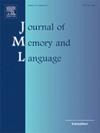工作记忆的个体差异与检索练习的益处
IF 3
1区 心理学
Q1 LINGUISTICS
引用次数: 0
摘要
之前关于工作记忆的个体差异与检索练习的益处之间的关系的研究得出了不同的结果,有各种各样的研究表明,不同的检索练习对工作记忆能力没有作用,而其他研究则发现,对工作记忆较差的个体来说,更多或更少的检索练习有益。目前的研究解决了(a)学习任务过程的变化和(b)工作记忆的测量如何影响工作记忆和检索练习之间关系的存在和/或强度。为了确保实验1和2中较高的初始检索成功率,我们使用了一种从学习到标准的程序,这种程序在以前检查个体差异的检索实践研究中没有使用过。实验3将实验1和实验2的结果扩展到不同的学习任务材料,同时试图复制先前的一项研究,该研究表明,特定的检索练习对工作记忆较低的个体有益。此外,使用操作跨度的部分和绝对评分方法进行了单独的分析,以解决先前研究中的可变性。在所有三个实验中,检索练习的表现优于重新学习,而且无论工作记忆能力的个体差异如何,这种好处都是存在的。本文章由计算机程序翻译,如有差异,请以英文原文为准。
Individual differences in working memory and the benefit of retrieval practice
Previous research on the association between individual differences in working memory and the benefit of retrieval practice has yielded mixed results, with various studies showing no differential retrieval practice benefit as a function of working memory ability, and others finding either more or less retrieval practice benefit for individuals lower in working memory. The current studies addressed how (a) variations in the learning task procedure and (b) measurement of working memory might influence the presence and/or strength of the relationship between working memory and retrieval practice. To ensure high initial retrieval success in Experiments 1 and 2, we used a learning-to-criterion procedure which had not been used in previous retrieval practice studies that examined individual differences. Experiment 3 extended the results of Experiments 1 and 2 to different learning task materials, while attempting to replicate a previous study that had shown a specific retrieval practice benefit for individuals with lower working memory. Additionally, separate analyses were conducted using partial and absolute scoring methods for operation span to address variability in previous research. Across all three experiments, retrieval practice outperformed restudying, and this benefit held regardless of individual differences in working memory ability.
求助全文
通过发布文献求助,成功后即可免费获取论文全文。
去求助
来源期刊
CiteScore
8.70
自引率
14.00%
发文量
49
审稿时长
12.7 weeks
期刊介绍:
Articles in the Journal of Memory and Language contribute to the formulation of scientific issues and theories in the areas of memory, language comprehension and production, and cognitive processes. Special emphasis is given to research articles that provide new theoretical insights based on a carefully laid empirical foundation. The journal generally favors articles that provide multiple experiments. In addition, significant theoretical papers without new experimental findings may be published.
The Journal of Memory and Language is a valuable tool for cognitive scientists, including psychologists, linguists, and others interested in memory and learning, language, reading, and speech.
Research Areas include:
• Topics that illuminate aspects of memory or language processing
• Linguistics
• Neuropsychology.

 求助内容:
求助内容: 应助结果提醒方式:
应助结果提醒方式:


